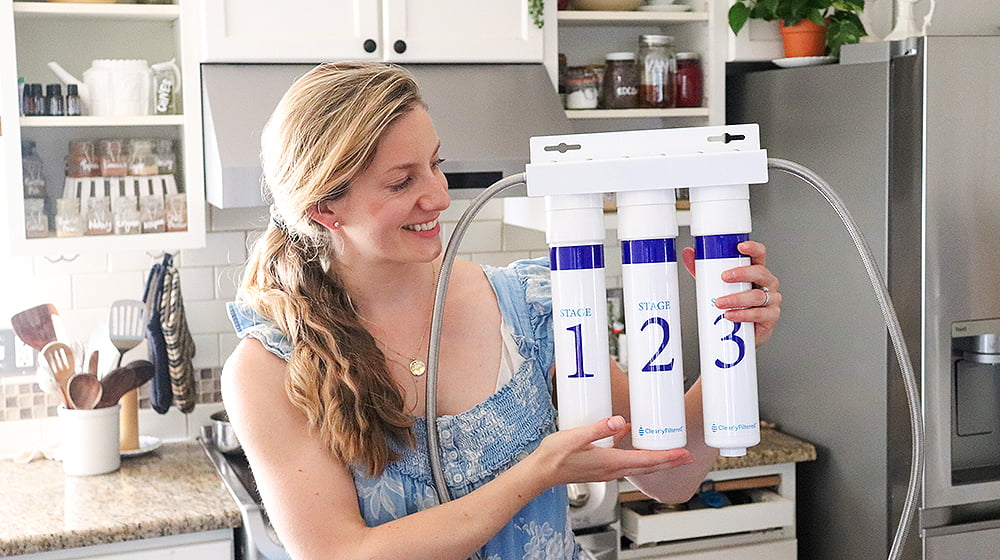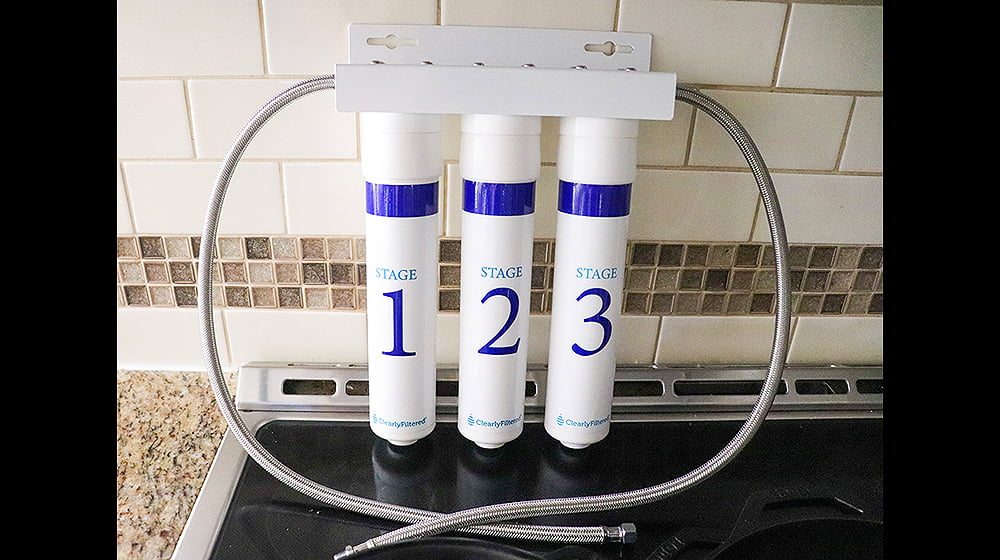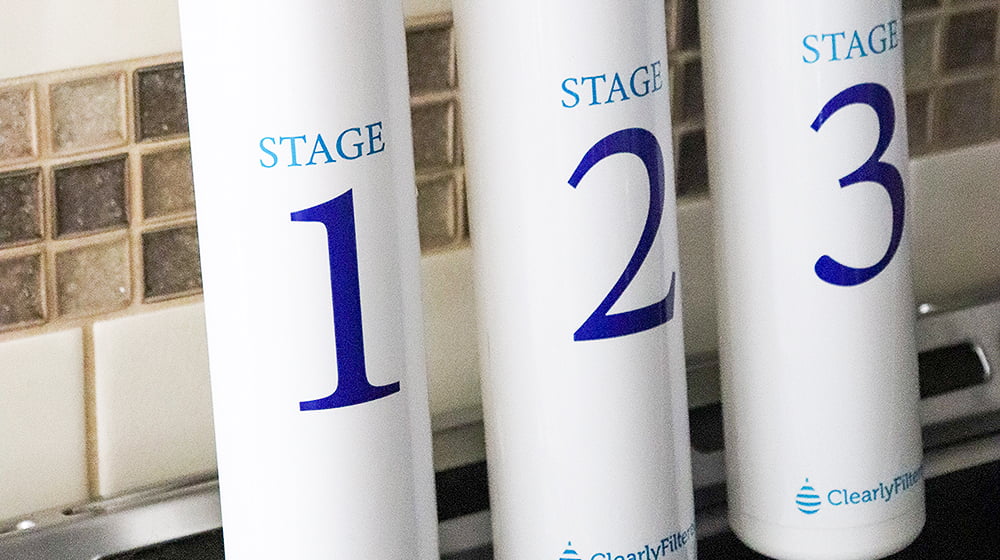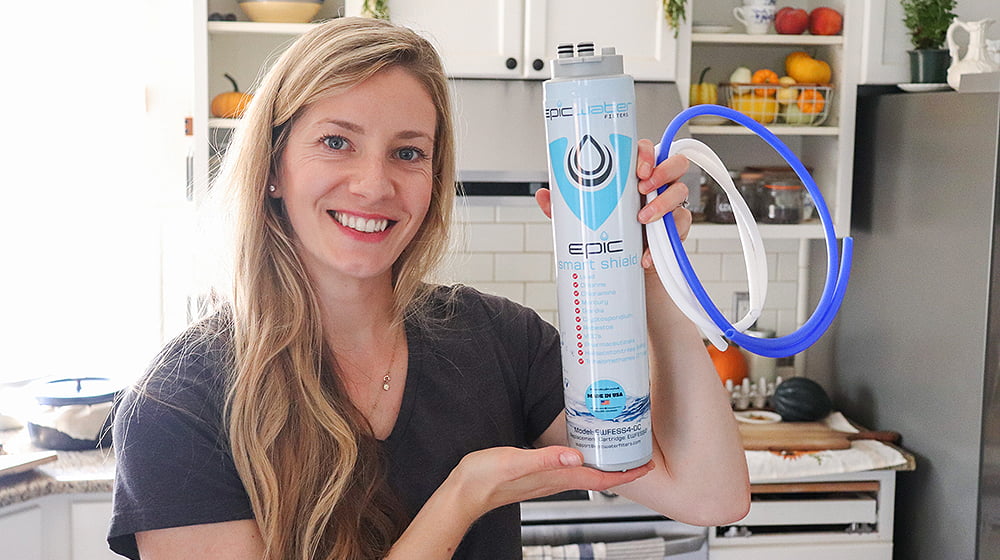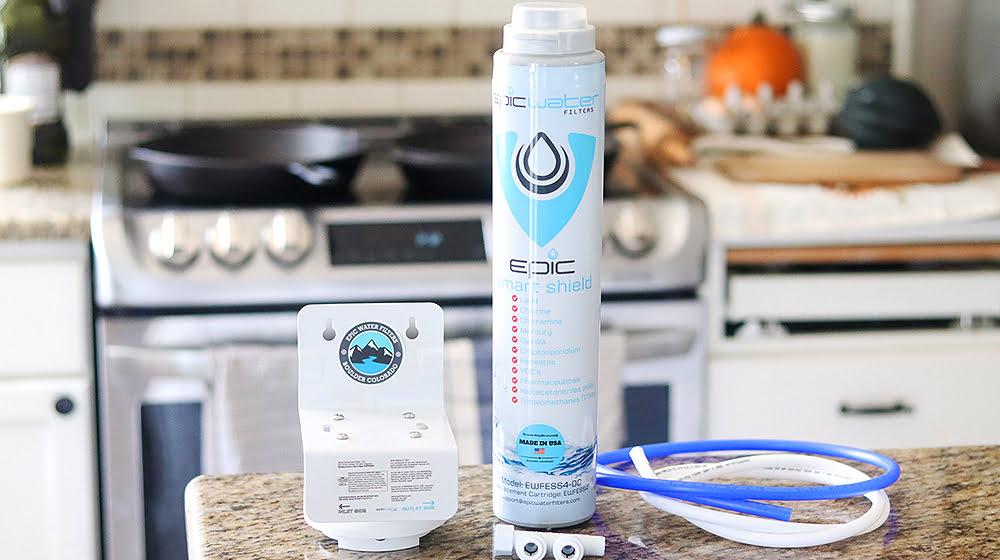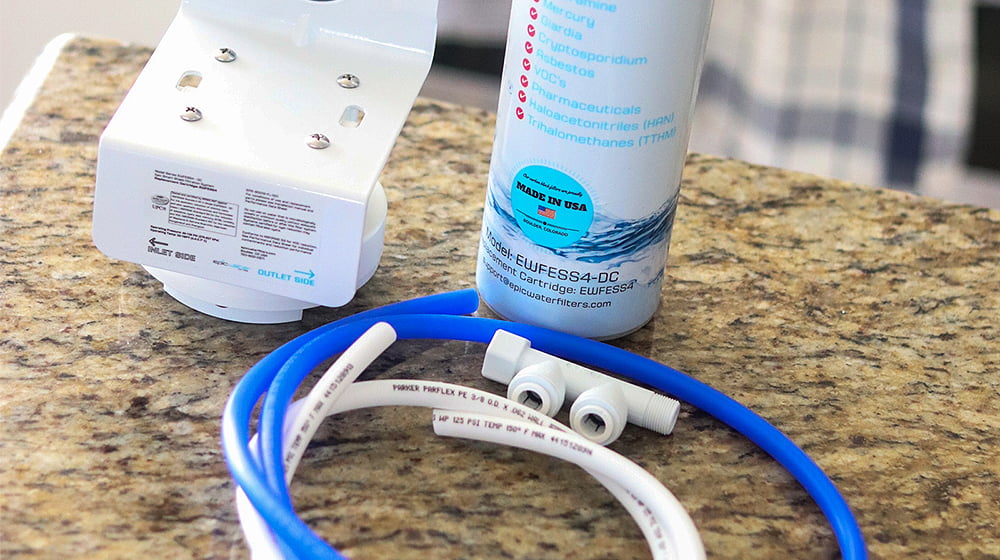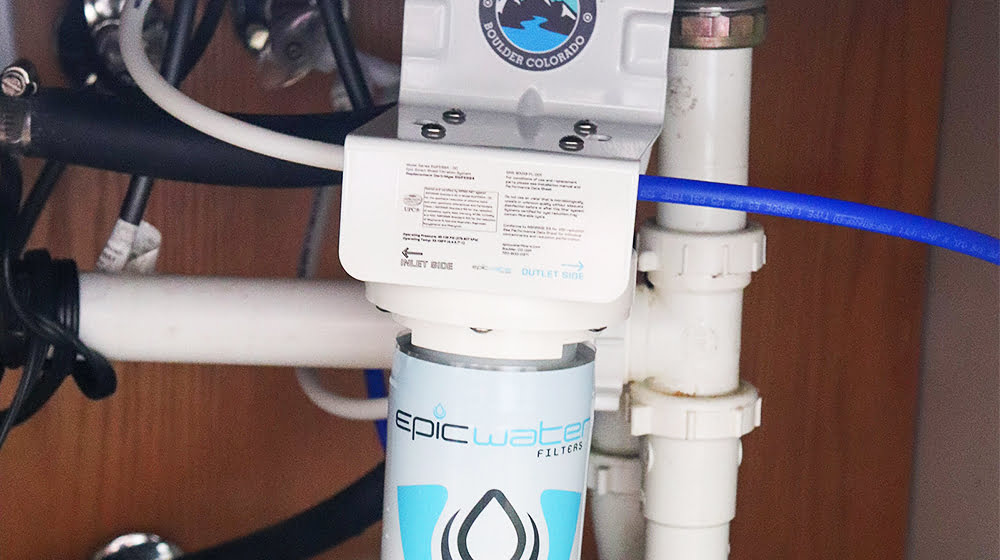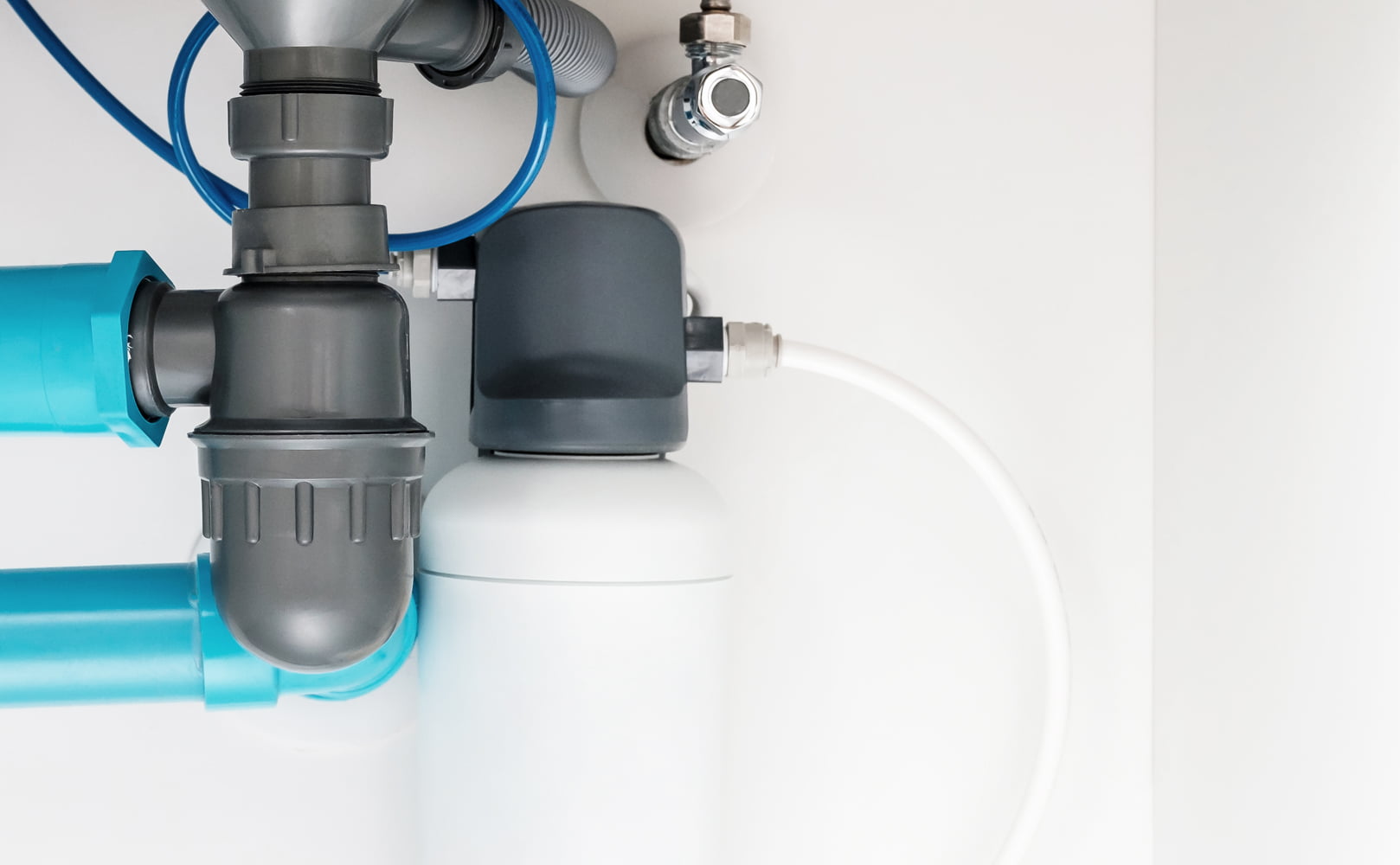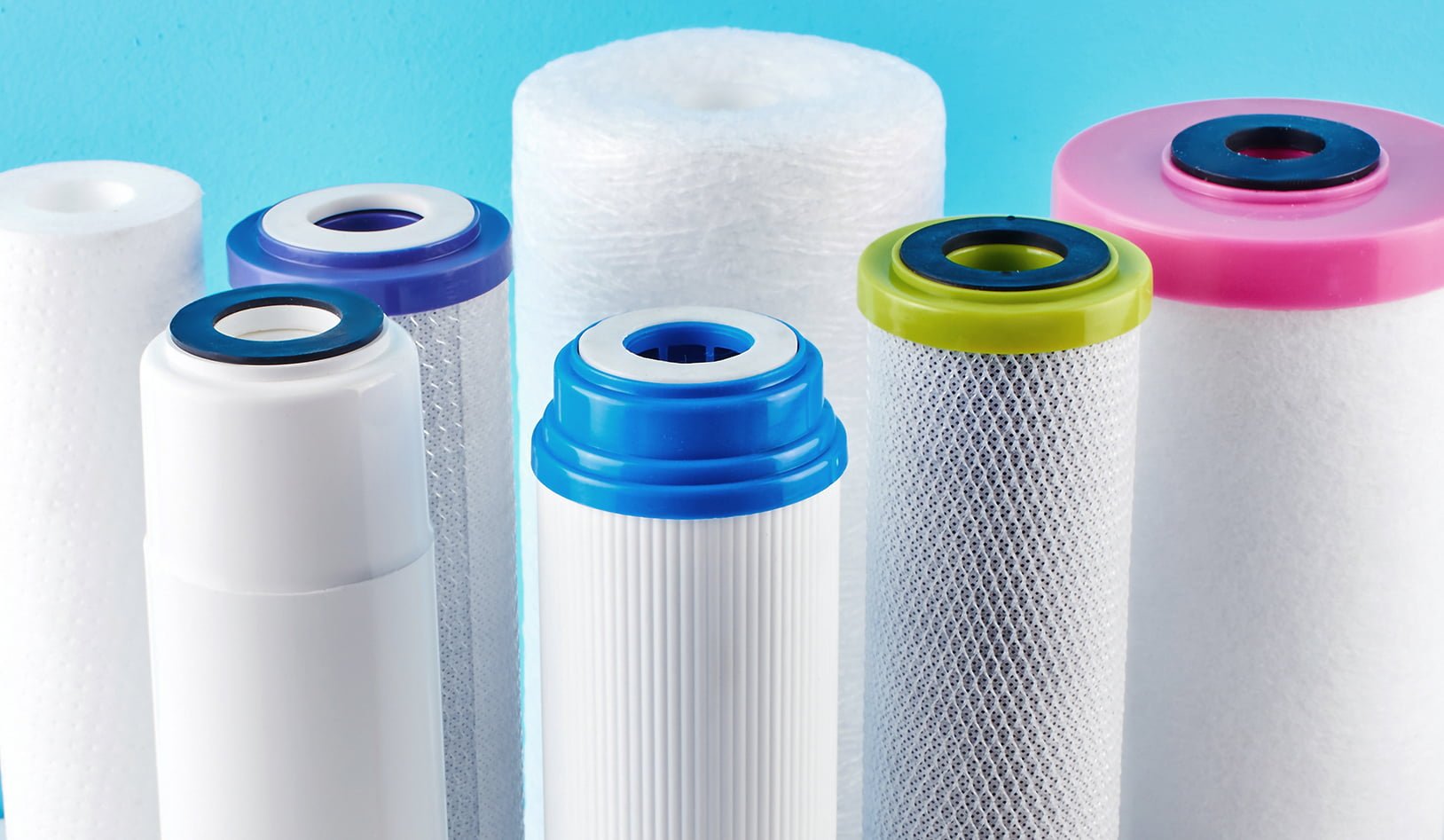5 Best Inline Water Filters for Well Water (*Update 2024)
Written by: Gene Fitzgerald // Expert Fact-Checking: Buddhini Dolapihilla, MBSS // Last Updated: Jan 31, 2024
This page may contain affiliate links. If you buy a product or service through such a link we earn a commission at no extra cost to you. Learn more.
Top Pick: What’s the Best Inline Water Filter for Well Water?
The best inline water filter for well water in 2024 is the Clearly Filtered 3-Stage. It is NSF-tested to remove 230+ contaminants, super easy to install and maintain, durable, backed by a 30-day satisfaction guarantee and lifetime warranty, and it has a long filter life of 2,000 gallons.
Looking for a guide to navigate the intricate labyrinth of inline water filters for well water? You came to the right place! Our team of experts has done all the legwork to handpick the absolute best options for you. Whether you’re on a mission to banish harmful well water contaminants or simply craving a refreshing upgrade to your hydration experience, we’ve got the perfect filtration solution waiting for you.
To ensure you make the most informed decision, we’ve meticulously scrutinized over 19 inline water filters, examining every minute detail under our expert microscope. Our findings have led us to the most effective filters specifically tailored for well water treatment!
No Time to Read? Check Our List of the Best Inline Water Filters for Well Water!
| Product | Details | |
|---|---|---|
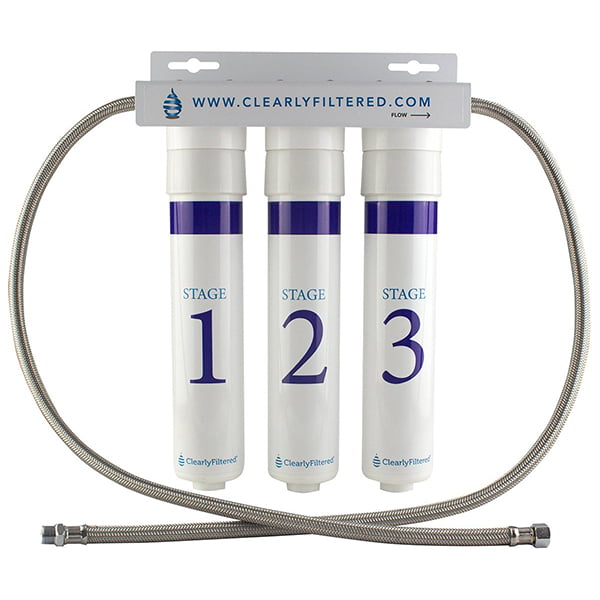 Best Overall: Clearly Filtered 3-Stage |
Overall Rating: 5.0/5.0 ⓘRatings based on effectiveness of well water filtration, NSF testing or certification, filter life, cost, our own testing, user ratings, warranty and support, and other factors.
Get 10% Off! Use Code: |
Price: $$$ Type: Under Sink Filter Life: 2,000 Gallons NSF: 42, 53, 401 Annual Cost: $440 Read Review: Click Alexa’s Video Review: Click |
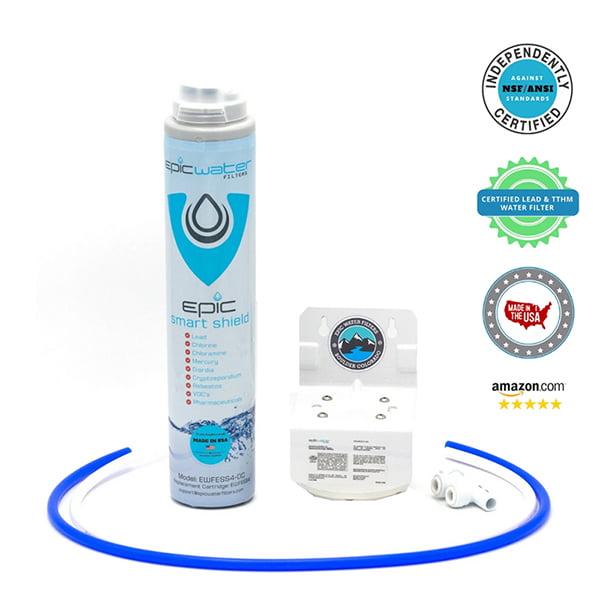 Best Budget Pick: Epic Smart Shield |
Overall Rating: 4.5/5.0 ⓘRatings based on effectiveness of well water filtration, NSF testing or certification, filter life, cost, our own testing, user ratings, warranty and support, and other factors.
Get 20% Off! Use Code: |
Price: $ Type: Under Sink Filter Life: 651 Gallons NSF: 42, 53, 401 Annual Cost: $115 Read Review: Click Alexa’s Video Review: Click |
 Best for Fridges/Ice Makers: Clearly Filtered Universal |
Overall Rating: 5.0/5.0 ⓘRatings based on effectiveness of well water filtration, NSF testing or certification, filter life, cost, our own testing, user ratings, warranty and support, and other factors.
Get 10% Off! Use Code: |
Price: $$ Type: Standard Filter Life: 365 Gallons NSF: 42, 53, 401 Annual Cost: $165 Read Review: Click |
 Best for Faucet Mounting: PUR |
Overall Rating: 4.5/5.0 ⓘRatings based on effectiveness of well water filtration, NSF testing or certification, filter life, cost, our own testing, user ratings, warranty and support, and other factors.
|
Price: $ Type: Faucet-Mounted Filter Life: 100 Gallons NSF: 42, 53, 401 Annual Cost: ~$50-100 Read Review: Click |
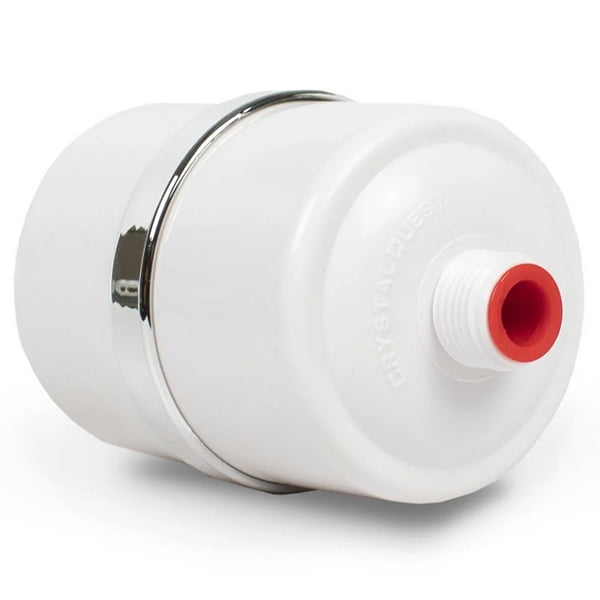 Best for Showers: Crystal Quest Luxury Shower Power Filter |
Overall Rating: 4.5/5.0 ⓘRatings based on effectiveness of well water filtration, NSF testing or certification, filter life, cost, our own testing, user ratings, warranty and support, and other factors.
Get 5% Off! Use Code: |
Price: $ Type: Shower Filter Filter Life: 6-12 Months NSF: – Annual Cost: $30-60 Read Review: Click |
Inline Well Water Filter Reviews
Our Top Picks
- Clearly Filtered 3-Stage – Best Overall
- Epic Smart Shield – Best for Lower Budgets
- Clearly Filtered Universal – Best for Fridges and Ice Makers
- PUR Horizontal – Best for Faucet Mounting
- Crystal Quest – Best for Your Shower
1. Best Overall: Clearly Filtered 3-Stage
In our opinion, the best inline water filter for well water in 2024 is the Clearly Filtered 3-Stage. It’s an under sink water filter that’s highly effective at removing a wide range of harmful contaminants and also improve the taste and smell of drinking water.

Clearly Filtered 3-Stage Under Sink Inline Water Filter |
|
| Price: | $$$ |
| Inline Filter Type: | Under Sink |
| Filtration Capacity: | 2,000 gal |
| NSF Standards: | NSF 42, 53, 401 |
| Annually: | $440 |
|
Overall Rating: 5.0/5.0 ⓘRatings based on effectiveness of well water filtration, NSF testing or certification, filter life, cost, our own testing, user ratings, warranty and support, and other factors.
Get 10% Off! Use Code: |
|
Alexa’s Video Review
As part of the BOS team, Alexa has installed and tested the Clearly Filtered Under-the-Sink Water Filter System in her own home and with her own hands. She has used the system for several weeks to gather genuine first-hand experience. And most importantly, Alexa has documented the entire process, including her findings and personal opinion, in the video below:
Other Specs
- Model: 3-Stage Under the Sink Water Filter System
- Last Price: $550
- Filter Media: Activated Carbon + Proprietary Blend
- Filter Stages: 3
- WxHxD: 15″x15.4″x3.1″
- Fitting: ⅜”
- Warranty: Limited Lifetime
Key Features & Pros
- Made in the USA.
- 3-stage under sink water filter works great for well water.
- The first stage is a coconut carbon filter which removes sediment, chlorine, pesticides, VOCS, and other organics and contaminants that could negatively affect the taste of your water.
- The second stage uses a special blend of filter media to eliminate mostly heavy metals and radiation.
- The last stage removes arsenic and fluoride.
- The unit is NSF tested for standards 401, 53, and 42, which essentially means it’s highly effective at what it does.
- Will remove over 232 contaminants common to well water systems.
- The CF won’t eliminate essential minerals like magnesium and potassium from your well water.
- Installation is simple and can be performed in under 15 minutes with no plumber or power tools required.
- Under sink inline design means you can install it with your existing kitchen faucet.
- Can be removed easily, making it a good option for renters.
- The only maintenance required is changing the filters annually. The filter capacity is 2,000 gallons, which is adequate for 1 year.
- Limited lifetime warranty on the system, and a 30-day money-back satisfaction guarantee in case you aren’t happy with the buy.
- Free shipping and responsive customer service.
Cons
- Water with higher TDS may require additional pre-filtration for the system to work properly.
- Potential for a 25-35% drop in water pressure. This is not a major issue, but something to be aware of.
- Costs more than other under sink inline well water filters. This can be explained by the filter’s superior quality and performance, so it’s more of a tradeoff than a real drawback.
Our Rating
- Filtration Performance: 5.0/5.0
- Filter Life: 5.0/5.0
- Price: 4.0/5.0
- Maintenance Cost: 4.5/5.0
- Overall: 5.0/5.0
Best for
The Clearly Filtered 3-Stage system is best for people who want top-tier inline filtration for well water that’s easy to install and maintain.
→ Get the Full CF Under Sink Water Filter Review Here
2. Best Budget Option: Epic Smart Shield Inline Under Sink Well Water Filter
In case the Clearly Filtered is above your budget, we recommend the Epic Smart Shield as the next best inline filter for well water. It is highly affordable yet effective!

Epic Smart Shield Under Sink Water Filter |
|
| Price: | $ |
| Inline Filter Type: | Under Sink |
| Filtration Capacity: | 651 gal |
| NSF Standards: | 42, 53, 401 |
| Annually: | $115 |
|
Overall Rating: 4.5/5.0 ⓘRatings based on effectiveness of well water filtration, NSF testing or certification, filter life, cost, our own testing, user ratings, warranty and support, and other factors.
Get 20% Off! Use Code: |
|
Alexa’s Video Review
Being an integral member of the BOS team, Alexa has ordered and tested the Epic Smart Shield Under Sink Water Filter at home. She shares her hands-on experience of installing and using the system in the video below:
Other Specs
- Model: Epic Smart Shield
- Last Price: $135.00
- Filter Media: Carbon Block
- Flow Rate: 1.25 gpm
- WxHxD: 4.25″x19.75″x4.5″
- Water Temperature: 33-100 °F
- Operating Pressure: 40-120 psi
- Warranty: Lifetime
Key Features & Pros
- The entire system is made in the USA.
- The system is not designed solely for well water applications. If you’re on well water, the manufacturer recommends installing a 5-micron sediment filter upstream to increase the filter’s lifespan.
- An activated coconut carbon block filter removes over 70 common contaminants.
- NSF-certified to standards 401, 53, and 42. The system will remove 95.5% of chlorine odor and taste, 99.9% of cysts, as well as VOCs, pesticides, PFAS, microplastics, and much more.
- The filter is tested and certified to 651 gallons or 12 months, whichever comes first.
- Installation is simple and easy as it’s designed for DIY setup.
- Quick connect fittings and inline design.
- Comes with an installation kit.
- The only maintenance required is changing the filter cartridge every 12 months (or 651 gallons). This costs just $92 annually when you sign up for the Clean Water Club subscription.
- The company is committed to recycling. If you return three old filter cartridges, they’ll send you a new one for free!
- Lifetime warranty on the system and return policy.
- Excellent and responsive customer service.
Cons
- The flow rate is just 1.25 gallons per minute. This will cause a pressure drop at the faucet, but most users don’t have a major issue with this.
Our Rating
- Filtration Performance: 4.5/5.0
- Filter Life: 4.0/5.0
- Price: 5.0/5.0
- Maintenance Cost: 5.0/5.0
- Overall: 4.5/5.0
Best for
The Epic Smart Shield is best when you’re looking for inline well water filtration at a budget price.
→ Full Epic Smart Shield Water Filter Review
3. Best for Refrigerators/Ice Makers: Clearly Filtered Universal Inline Filter
This next inline water filter is best for use with refrigerators and ice makers: The Clearly Filtered Universal.

Clearly Filtered Universal Inline Water Filter |
|
| Price: | $$ |
| Inline Filter Type: | Standard |
| Filtration Capacity: | 365 gal |
| NSF Standards: | 42, 53, 401 |
| Annually: | $165 |
|
Overall Rating: 5.0/5.0 ⓘRatings based on effectiveness of well water filtration, NSF testing or certification, filter life, cost, our own testing, user ratings, warranty and support, and other factors.
Get 10% Off! Use Code: |
|
Other Specs
- Model: Universal Inline Fridge Filter
- Last Price: $165
- Filter Media: Carbon + Proprietary Blend
- WxHxD: 12″x2″x2″
- Water Temperature: 38-85° °F
- Warranty: Limited Lifetime
Key Features & Pros
- Made in the USA.
- Single-cartridge inline filter system fits behind your refrigerator or in any tight space. The filter will work with any refrigerator or ice maker, provided there’s a ¼” water line.
- Can also be fitted to other water line sizes with an adapter.
- The filter uses three stages to remove a wide array of contaminants from well water.
- Stage 1 – Activated Carbon: The first stage features activated carbon to remove chlorine, chloramine, herbicides/pesticides, organic compounds, and more.
- Stage 2 – Specialized Heavy Metal Media: The second stage removes heavy metals including lead, chromium-6, cadmium, mercury, and more. It will also remove microplastics, radiation, and VOCs.
- Stage 3 – Fluoride Media: The final stage will remove fluoride as well as arsenic.
- The system is NSF/ANSI tested to meet Standards 42, 53, and 401.
- The installation process is fast and easy due to the included push-fittings. All that’s needed to connect is joining the inlet and outlet port on the filter to the existing water line.
- The system comes with a mounting bracket and screws for easier installation.
- You can purchase the system for either braided stainless-steel lines or with plastic/vinyl/copper depending on your preference.
- Has a 365-gallon filter life, which will last for an average of 12 months. This is 2 to 4 times longer than the average fridge filter.
- Lifetime warranty (limited).
- 30-day money-back guarantee in case you’re not satisfied.
Cons
- The filter may last less than 12 months, depending on your usage level.
Our Rating
- Filtration Performance: 5.0/5.0
- Filter Life: 4.5/5.0
- Price: 4.0/5.0
- Annual Cost: 5.0/5.0
- Overall: 5.0/5.0
Best for
The Clearly Filtered Universal inline water filter is best for anyone looking for an inline well water filter for their fridge or ice maker.
4. Best to Connect Directly to Kitchen Faucet: PUR Horizontal
Not directly an inline water filter, the PUR horizontal is a faucet-mounted system that connects directly to kitchen and bathrooms taps. It’s super affordable, easy to install and maintain, and reliable in terms of filtration.

PUR Horizontal Faucet Water Filter |
|
| Price: | $ |
| Inline Filter Type: | Faucet-Mounted |
| Filtration Capacity: | 100 gal |
| NSF Standards: | 42, 53, 401 |
| Annually: | ~$50-100 |
|
Overall Rating: 4.5/5.0 ⓘRatings based on effectiveness of well water filtration, NSF testing or certification, filter life, cost, our own testing, user ratings, warranty and support, and other factors.
|
|
Other Specs
- Model: PFM400H
- Filter Media: Carbon + Ion Exchange
- Flow Rate: 0.52 gpm
- WxHxD: 6.8″x2.9″x5.2″
- Water Temperature: 34-100 °F
- Operating Pressure: 20-100 psi
- Warranty: 2 Years
Key Features & Pros
- The PUR horizontal faucet water filter uses both activated carbon and ion exchange resin to eliminate more than 70 contaminants from well water. This includes chlorine, asbestos, lead, cysts, TTHMs, VOCs, pesticides, and herbicides.
- The system is NSF certified to standards 42, 53, and 401.
- The PUR is available in many different colors and finishes, but the underlying filter design is the same in all models.
- There are two possible filter cartridges available: the PUR Faucet Filter and the PUR PLUS Mineral Core. The major difference between the two filters is the addition of minerals in the PUR PLUS.
- The mineral core enriches your well water minerals for improved taste and odor.
- The flow rate is 0.52 gallons per minute, which is normal for this type of filter system.
- The filter will last for 100 gallons or 3 months, depending on your level of usage.
- Installation is extremely fast and easy – no tools are required.
- Simply place the filter inside the system, then screw the cover back on. Then remove the aerator and washer from your faucet, and then attach the faucet mount.
- Will work with most standard-sized faucet types.
- Very little maintenance is required. All that’s required is changing the filter cartridges approximately every 3 months.
- Changing filter cartridges is fast and easy, tool-free, and takes just 2 minutes.
- A CleanSensor indicator light lets you know when it’s time to change filter cartridges.
- You can swap between filter mode and raw well water by rotating the lever on the filter.
- 2-year warranty.
- Partake in PUR’S recycling program!
Cons
- The indicator lights for filter changes tend to stop working after several filter changes.
- System construction is fairly fragile – especially the filter housing.
- The connection between the faucet and the system can be somewhat wobbly, depending on your faucet design.
- A small proportion of users reported having issues with the water flow rate slowing down significantly after several weeks.
Our Rating
- Filtration Performance: 4.5/5.0
- Filter Life: 4.0/5.0
- Price: 5.0/5.0
- Maintenance Cost: 4.5/5.0
- Overall: 4.5/5.0
Best for
If you’re looking for a quality direct-to-faucet filter system, then the PUR Horizontal makes an excellent option.
5. Best for Your Shower: Crystal Quest Luxury Shower Power Filter
Want an inline shower water filter for well water? We hear you, and we found exactly what you need – the Crystal Quest Luxury Shower Power Filter!
Other Specs
- Model: CQE-SP-00800, CQE-SP-00802
- Last Price: $44.95
- Filter Media: KDF + GAC
- Flow Rate: 2 gpm
- WxHxD: 3″x8″x3″
- Water Temperature: 40-110 °F
- Operating Pressure: 30-60 psi
- Warranty: 1 Year
Key Features & Pros
- 3-Stage inline filter system combines two forms of KDF media (ERA 6500 and ERA 9500) with coconut shell granular activated carbon.
- As a result, the shower filter will remove chlorine, trihalomethanes, sulfur, heavy metals, hydrogen sulfide (rotten egg smell), iron oxides, sediment, and more.
- KDF media will also help to prevent the growth of microbial contaminants like bacteria, algae, and fungi inside the filter.
- Removal of the above contaminants will result in smoother and softer skin and hair. It will also result in a cleaner bath and tub from reduced sediment and contaminants.
- The system comes in several different configurations:
- With or without a shower head.
- With a handheld wand: This version includes a 5 ¼ foot hose with a head that can be set to three different spray settings.
- With a handheld wand and a shower head: This version includes a regular shower head and a 5 ¼ foot hose with a handheld wand with 3 spray settings.
- The recommended flow rate is 2 gallons per minute, with a peak rate of 2.5 gpm.
- Installation is simple and easy and about the same amount of work as installing a normal shower head.
- Filter capacity is 6 months to one year. Annual costs are just $30 to $60 for cartridge replacements.
- Reversing the cartridge and allowing water to flow through it will flush the cartridge – eliminating channeling and extending its lifespan.
- One-year manufacturer’s warranty on the system.
Cons
- A small percentage of users reported leaking from the water hose, the filter seam, or the ball joint.
Our Rating
- Filtration Performance: 4.5/5.0
- Filter Life: 4.5/5.0
- Price: 5.0/5.0
- Annual Cost: 5.0/5.0
- Overall: 4.5/5.0
Best for
The system is best for anyone on well supplied water that needs a shower filter to reduce iron, sulfur, and other common well water contaminants.
Comparison List
(Mobile Hint: Swipe to Scroll)
| Model | Price | Inline Filter Type | Filter Media | Filtration Capacity | Flow Rate | NSF Standards | Annually | Warranty | Additional Info |
|---|---|---|---|---|---|---|---|---|---|
| Clearly Filtered 3-Stage Under Sink Inline Water Filter | $$$ | Under Sink | Activated Carbon + Proprietary Blends | 2,000 gal | ? | 42, 53, 401 | $440 | Lifetime (Limited) | |
| Epic Smart Shield Under Sink Water Filter | $ | Under Sink | Activated Carbon Block | 651 gal | 1.25 gpm | 42, 53, 401 | $115 | Lifetime | |
| Clearly Filtered Universal Inline Water Filter | $$ | Standard | Carbon + Proprietary Blend | 365 gal | ? | 42, 53, 401 | $165 | Limited Lifetime | |
| PUR Horizontal Faucet Water Filter | $ | Faucet-Mounted | Activated Carbon + Ion Exchange Resin | 100 gal | 0.52 gpm | 42, 53, 401 | ~$50-100 | 2 Years | |
| Crystal Quest Luxury Shower Power Filter | $ | Shower Filter | KDF + GAC | 6-12 Months | 2 gpm | – | $30-60 | 1 Year |
Buying Guide: How to Choose the Inline Well Water Filter That’s Best for You
The following are key features worth considering when shopping for an inline well water filter. They will help you choose the right on for your needs and budget.
Well Water Quality and Contaminants
Anytime you’re looking into purchasing a water filter, the first step is determining which contaminants you’ll need to deal with. That way you’ll be able to tailor your system purchase to remove the specific contaminants you’ve identified.
For well water, this can be done in two different ways – by getting your water professionally tested, or testing it yourself with a home test kit.
Sending in a water sample for professional testing is the more thorough method, as it will both identify the contaminants in your well and give you their precise quantities. This will cost several hundred dollars and take a little time to get your results.
The other method involves testing the water yourself with a home test kit. This is less accurate than professional testing but much is cheaper and could still give you a good idea of what you’re dealing with.
Well water tends to be more contaminated than municipal water, so you may discover the need for additional filtration beyond an inline system. This can mean adding a sediment filter at the point of entry or opting for a whole house system instead of just one that goes under your sink or so.
By the way, the most common contaminants found in well water are sediment, microorganisms, iron, manganese, and sulfur, organic chemicals, and several more heavy metals.
Type of Filter – What Do You Want to Achieve?
The type of inline water filter you’ll need will depend on what you’re trying to achieve. Inline filters connect to your existing water supply and as a result, are easy to install and don’t take up a lot of space.
There are several different inline filter types, including under sink filters, refrigerator/ice machine filters, faucet filters, and even shower filters.
In general, multi-stage water filters will be more effective than single-stage units, as they provide additional filter stages to remove contaminants from your well water.
Under sink water filters tend to be the most effective filter configuration, as they have larger filter media and longer contact time with water. Refrigerator/ice maker filters are somewhat less effective, as they’re smaller and single-stage, although you can also use an under sink filter for this if the flow rate is sufficient.
Faucet-mounted water filters are not strictly inline filters but operate similarly, so they’re included here. These filters are less effective than under sink or fridge filters, due to their small size and short contact time with the well water.
Lastly, shower-mounted inline water filters connect to your existing shower head and improve the quality of your shower water. These work similarly to faucet water filters in that they have a short contact time with the water and a small filter size. They also typically have hot water running through them, which is not ideal for filtration.
Filter Life
Filter life will depend on the specific filter (type) in question. Some inline filters for well water will last for an entire year before needing new cartridges, while others will last just 2 to 3 months before needing your attention.
Lower filter lifespans mean more frequent filter changes and potentially more costs.
Water Flow Rate
Flow rate refers to an inline water filter’s capacity to process water. It’s usually measured in gallons per minute (gpm) and varies heavily depending on the type of inline filter.
Flow rates should only be compared to filters of similar types. Comparing an under sink filter’s flow rate to a faucet filter’s flow rate doesn’t make sense, as these filters are designed with different use cases in mind.
If a filter’s flow rate is too low, the flow from the outlet will seem like a trickle and can be a pain to use.
Installation and Maintenance
When it comes to inline water filter systems for wells, installation and maintenance requirements are relatively low.
Installation for most inline filters can be done on your own in minutes and doesn’t require any special tools or skills. Under sink units are slightly more complex to install, as they may require you to cut into the water line under your sink, although this is less difficult than it sounds and most people can do this easily with detailed instructions.
As far as maintenance is concerned, most inline water filters only require simple cartridge replacements every few months to one year.
Cost
Under sink water filters are the most expensive type of inline system, but even these are significantly less expensive than whole house or most reverse osmosis systems.
Faucet-mounted filters are the least expensive filter type, followed by shower-mounted and fridge-mounted filters. All of these filters can be purchased for less than $100, making them cheap to install in multiple locations in your home.
Space
One of the biggest advantages of inline water filters is their low space demands. Multi-stage under sink filters are the largest type, and even they will easily fit under nearly all kitchen sinks.
Faucet water filters and shower water filters take up nearly zero space, making them great options when installing a larger filter isn’t possible.
Product Warranty
Anytime you’re purchasing a water filtration system, you’ll want to pay attention to the product warranty. Another thing to look for is a money-back satisfaction guarantee, which allows you to return the system if you’re unsatisfied for any reason.
In the filters reviewed above, the warranties vary from 1 year to lifetime.
NSF Certification
NSF certification refers to the accredited independent third-party certification awarded by the NSF or its partners. As a consumer, this is the best way to ensure an inline well water filter is performing in line with the claims made by the manufacturer. Without NSF certification, there would be no easy way to double-check the manufacturer’s claims.
So when shopping for an inline water filter for your well, these are the NSF certifications you should keep an eye out for.
- NSF Standard 42 (Aesthetic Effects): This standard covers the removal of ‘aesthetic effects’ from drinking water including chlorine taste and odor as well as particulate matter.
- NSF Standard 53 (Health Effects): This standard covers the removal of water contaminants with known health effects. This includes microbial contaminants like cryptosporidium and giardia as well as non-microbial contaminants like volatile organic compounds (VOCs) and lead.
- NSF Standard P231 (Microbial Filtration): This is the standard for health and sanitation based on the EPA’s task force recommendations. It’s especially important to look for when considering well water filters, as it certifies the removal of certain bacteria, viruses, and cysts.
- NSF Standard 401 (Contamination/Emerging Compounds): This standard pertains to the removal of emerging contaminants like pharmaceuticals, pesticides, herbicides, flame retardants, detergents, as well as certain chemicals from industrial runoffs.
If a product doesn’t have NSF certification, it should at least have NSF testing. As inline filters are generally used for drinking water applications, you want to be as thorough as possible when it comes to certification.
More on Inline Water Filters for Well Water
What Is an Inline Water Filter for Well Water and How Does It Work?
An inline water filter for well water is any point-of-use filter that sits directly on the water line without its own faucet or outlet. This means the filter will not require complex installation; rather it’s simply plumbed into an existing water line.
As well water flows through this line, it enters the inline water filter and its filter media. This can be a single or include multiple stages of filtration. Depending on the filter media used, different types of well water contaminants will be removed, such as pesticides, heavy metals, or bacteria.
Inline well water filters can be connected to the water line running to a kitchen or bathroom faucet, a fridge, or even a shower head.
Types of Inline Filters for Well Water
Inline filters are versatile in that you can hook one up to more or less any water line and filter the water passing through. It’s nonetheless helpful to differentiate between the different types.
Inline Water Filters That Go Under the Sink
Probably the most common form of inline filters are under sink water filters. These filters, as the name suggests, are mounted underneath a sink and filter water passing through the faucet on top.
Since under sink reverse osmosis systems require a separate faucet and a drain connection, they don’t qualify as inline water filters.
Inline Water Filters for Refrigerators/Ice Makers
These systems are typically mounted behind (or in some cases inside the fridge or ice maker). These filters will filter the water running to your fridge’s water dispenser or the ice maker.
You can use a normal under sink filter for this job as well, but the filters made specifically for fridges/ice makers are typically smaller and cheaper.
Faucet-Mounted Inline Water Filters
Faucet-mounted systems are small water filters that attach directly to a sink faucet. Their typically inexpensive and offer a limited level of filtration, but are very easy to install and maintain.
Shower Filters
Shower filters are inline filters that mount directly to your shower head. Like faucet-mounted filters, they’re typically inexpensive and limited in their filtration capabilities, but that’s not a major drawback as you won’t be drinking this water – or at least we hope not!
Inline Filters for Washing Machines, RVs, Water Coolers, and More
There are a wide range of different inline filter designs, including inline filters for household appliances like washing machines, dishwashers, RVs, water coolers, and more. Reviewing all of these is beyond the scope of this article, but suffice it to say there are plenty of good options in these categories.
Advantages of Inline Well Water Filters
Installation
Perhaps the biggest advantage of inline well water filters is how easy they are to install. Most inline filters can be installed in minutes and many without any tools at all. Even under sink systems, which are the most complex type, can be installed fairly easily by almost anyone.
Water Taste and Aesthetics
An inline filter will immediately improve the taste and aesthetics of your drinking water. This is especially true if your well water has any foul tastes/odors – which will be removed as soon as you start filtering water.
Cost
Inline filter systems are relatively inexpensive when compared with other filter types like reverse osmosis or whole house setups.
Ease of Use
When it comes to ease of use, inline water filters that go under sink are about as easy as it gets. All you need to do is turn on your normal faucet, and filtered water comes out.
Contrast that with reverse osmosis systems that require storage tanks or pitcher/sinktop systems that require manual refilling.
Easy Maintenance
An inline filter for well water is very easy to maintain, and for most all that’s needed is occasional changing of the filter cartridge.
Reduced Bottled Water Use
If you’ve been sourcing your drinking water from plastic bottled water, then switching over to an inline water filter will not only save you money but it’ll reduce your plastic waste significantly.
Disadvantages of Inline Well Water Filters
More Frequent Filter Replacements
Many inline filter systems only require cartridge changes every 12 months when used on city water. For well water, you may be looking at filter lives of 6 months or so. That’s because well water tends to be dirtier and more heavily contaminated than tap water.
Potential Water Pressure Drop
Depending on the system in question, you may experience a drop in your water pressure after installing an inline filter. Again, this is more of an issue with well water than city water.
Filtration Effectiveness
When filtering well water, an inline filter alone may not be enough to provide adequate filtration. This is especially true if your water is high in particulates or iron, which may require a whole house well water filter before the inline filter.
Single Faucet
Of course, due to the design of inline filters, you’ll only be receiving filtered water from a single outlet. This is both a benefit and a drawback, but if you have many outlets that require filtration you may want to look into a whole house filter instead.
Frequently Asked Questions (FAQ)
- What is the best way to filter well water for drinking?
The first step you should take is to have your well water tested. Based on the results, you can choose the most appropriate treatment method. - Can you use an inline water filtration system on well water?
Yes, you can. However, some systems may require pre-filtration in order to prevent rapid clogging. - Do I need an inline water filter if I have well water?
Most well water supplies require filtration to make the water ready for use. An inline water filter can remove harmful contaminants and also improve water aesthetics. - Are carbon-based inline filters good for well water?
They can be great, but it all depends on the type of contamination you’re facing. - How often do you change an inline well water filter?
This mainly depends on the exact type used. Generally speaking, most inline water filters last up to 12 months. Smaller filters may need replacement every 3 to 6 months.
How We Chose and Tested the Best Inline Well Water Filters (Why Trust Us)
When it comes to picking the crème de la crème of inline water filters for well water, we know that reliable information is the key ingredient. That’s why we’ve cooked up a unique recipe to ensure our recommendations are as trustworthy as Granny’s secret sauce:
- We’ve sprinkled in our extensive experience and thorough research to create a list of 20 essential qualities that every inline water filter must possess in order to tackle the challenges faced by well water filtration.
- We went on a thrilling internet adventure, scouting far and wide to gather a whopping list of 25+ potential candidates for the title of the best inline well water filter. We even recruited the help of reputable brands like Clearly Filtered and Epic to add some extra spice to our insights.
- To separate the true champions from the pretenders, we put on our detective hats and investigated product manuals, descriptions, third-party lab reports, and user feedback from all corners of the web. Our rigorous examination had left us with less than 9 models who were ready to take on the well water challenge.
- But we didn’t stop there! We took some of the filters into the trenches and subjected them to real-life testing using an authentic water source. We assessed their performance in areas like ease of installation and use, filtration prowess, and the taste and odor of the freshly filtered well water.
- Then, to ensure that our recommendations are as reliable as a trusty well, we conducted our own lab testing using the esteemed Tap Score service. This allowed us to see how each filter performs under real-life conditions.
- We took all the juicy information we’d gathered and served it up in a delectable pros versus cons format. It’s like a menu of options, making it easy for you to compare and choose the perfect inline water filter for your well water needs.
Rest assured, our ratings and information are as independent and unbiased as a panel of water filter connoisseurs. We even have professionals who fact-check everything to ensure accuracy. The evaluation of contamination reduction claims was a crucial task undertaken by Buddhini Dolapihilla, MBSS. This involved verifying NSF certifications and thoroughly reviewing lab reports and other test data.
About Our Ratings
We’ve rated each inline well water filter on a score of 1 to 5, with 5 being the highest rating.
Our rating process is mostly based on 5 crucial factors: Contaminant reduction rates as per NSF standards (30%), purchase and maintenance cost (25%), 1st hand testing as well as 3rd party feedback (20%), filter life (15%), product support (10%).
Questions? Ask away!
Information provided on BOS is for educational purposes only. The products and services we review may not be right for your individual circumstances.
We adhere to strict editorial guidelines. Rest assured, the opinions expressed have not been provided, reviewed, or otherwise endorsed by our partners – they are unbiased, independent, and the author’s alone. Our licensed experts fact-check all content for accuracy. It is accurate as of the date posted and to the best of our knowledge.

